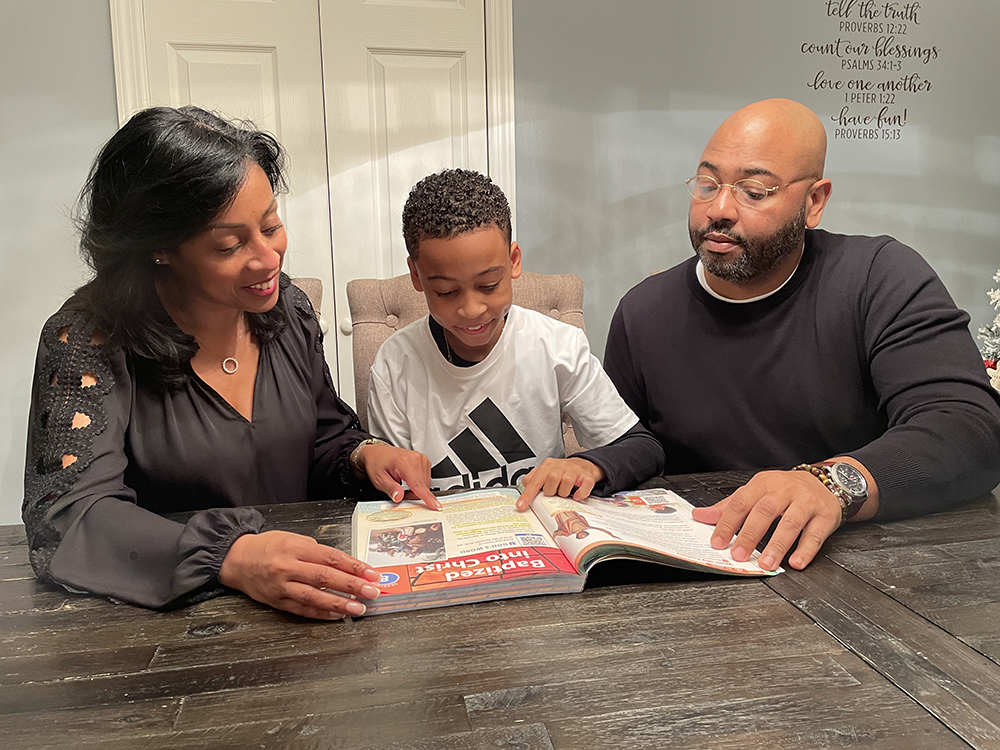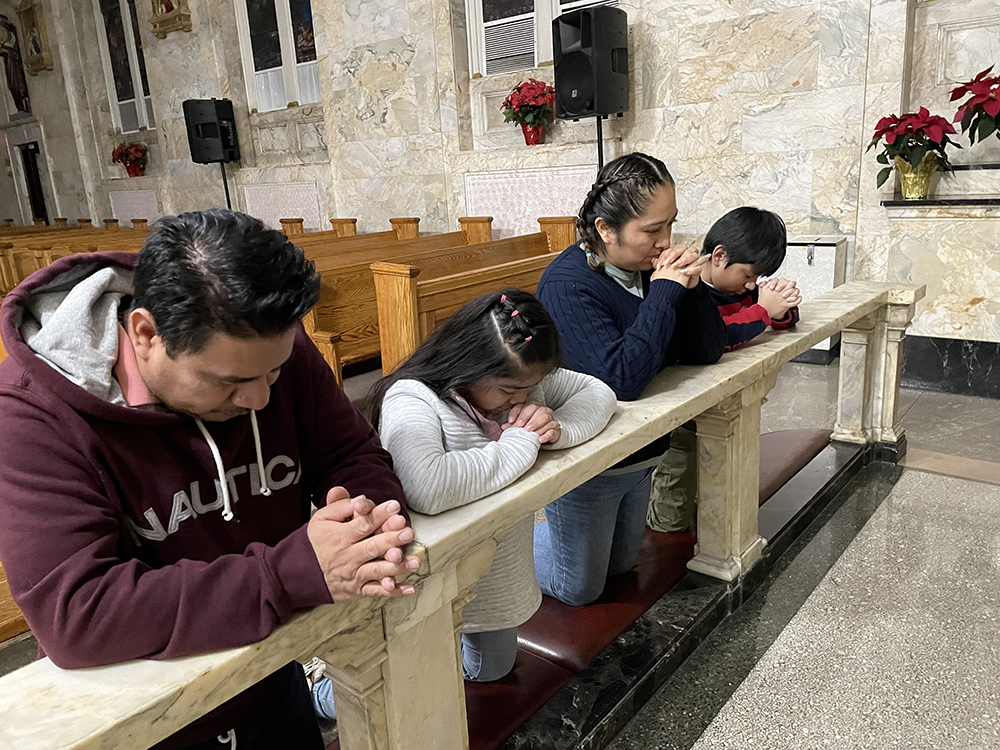
DOUGLASTON — Dawn and Randolph Padilla enrolled their 10-year-old son Christopher in the School of Religion at St. Anastasia Church in Douglaston to put him on a proper track for Catholic faith formation, but that’s not all they’re doing.
The couple isn’t leaving that duty up to a catechist, because they recognize that, as his parents, they are supposed to be his primary teachers.
So every Sunday, Dawn and Randolph are at their dining room table overseeing Christopher’s religious instruction. The youngster has already received the sacrament of holy Communion and is expected to receive confirmation in a couple of years.
His parents sit with him as Christopher reads a chapter a week from the textbook they were given by St. Anastasia’s faith formation director, Rose Ruesing, and they make sure he answers the 12-question quiz at the end of the chapter. Then, they send the quiz to Ruesing for her to grade.
“We do our lessons every Sunday because it’s God’s day. That’s how we feel,” said Dawn, the executive assistant to the chief financial officer at Nasdaq.
Christopher, a fifth grader at P.S. 221, enjoys learning about things like the lives of the saints with his parents right there beside him. “My parents are very helpful. I think doing it this way brings us closer together,” he said.
The Padillas, with their Sunday sessions in the dining room, are in a vanguard in the Diocese of Brooklyn.
Increasingly, Catholic parents are beginning to take responsibility for their children’s faith formation. And while they work under the supervision of their local parishes, they are serving as their children’s front-line teachers.
At the same time, the diocese is rethinking the time-honored faith formation model that has guided the process by which children prepare for the sacraments.
For many years, the job of imparting the faith to children has largely been left up to catechists, a system in which parents drop off their children at church for class, leave, and then return later to collect them.
But in recent years, family-oriented programs — in which parents play an important role in instructing children in the faith and take lessons to improve their knowledge — have started to take hold.
Father Joseph Gibino, vicar for evangelization and catechesis for the diocese, said the approach was born out of necessity.
“What we’ve discovered is that the classroom model really no longer works, that it’s just not effective anymore. The lack of involvement on the part of parents was an issue. It just didn’t seem that faith formation took hold when we did it that way,” he added.
Bishop Robert Brennan discussed the need for changes at a summit he held for catechetical leaders at Immaculate Conception Center on Sept. 21. “The realities are different,” he said at the summit.

In addition, the need to involve the entire family in faith formation became evident when results from the diocese’s synod process were analyzed, he said.
“What we heard in the synod was that parents don’t really feel that they know the faith — that they need help now to explain the faith to children,” Father Gibino explained.
To help parents, Father Gibino said churches will be holding faith formation meetings where priests and catechists will offer religious instruction, including discussions outlining the basic tenets of the faith.
According to Father Gibino, the monthly meetings will also include discussions of how families pray together and how families join together to celebrate the seasons of the church — Advent, Christmas, Ordinary Time, Lent, Easter, and Ordinary Time again.
“We want to reinforce that children learn to pray at home, not in the classroom. And that’s a big shift,” he added.
At St. Anastasia, parents can choose between the classroom-centered faith formation model and a homeschool setting where they serve as the instructors. There are currently 140 children enrolled in School of Religion — 40 of them in the homeschool sector.
Ruesing created the homeschool sector four years ago to accommodate parents with busy schedules.
The traditional classes, which take place on Wednesdays, are split into two sessions — 4 p.m. for kindergarten to fourth grade students and 7 p.m. for fifth to eighth graders. Ruesing noticed that parents with more than one child were opting to enroll one of their kids and not the other. “They didn’t want to keep running back and forth between the two sessions,” she explained.
The program at St. Anastasia reflects what Bishop Brennan said at the September summit, where he talked about the need for the diocese to develop a faith formation model that understands the realities of people’s lives — working parents, single parent homes, economic concerns, and other factors.
“We have to meet people where they are,” he explained.
The homeschool option doesn’t just make parents’ lives easier, it also serves a valuable purpose, Ruesing said, because it helps keep youngsters in the faith formation program during the “bridge years,” the time between the sacraments of Communion and confirmation, when some youngsters fall away. “Our retention rate is now 90%,” she added.
Suzette Poladian, director of religious education at St. Joseph Patron of the Universal Church in Bushwick, said the parish strongly encourages parents to take responsibility for their children’s faith formation. “We tell the parents, ‘We’re not giving out free sacraments. You have to put in the work,’ ” she explained.
While the parish still uses the traditional classroom model, St. Joseph also holds four mandatory sessions during the year — in October, November, March, and April — that parents must attend. However, rather than balk, “parents love it,” Poladian said.
The sessions include instruction in the basics, such as the meaning behind the four parts of the Mass — the Introductory Rites, the Liturgy of the Word, the Liturgy of the Eucharist, and the Concluding Rites — and discussions to explain that the Bible isn’t just one book but is actually 73 books — 46 in the Old Testament and 27 in the New Testament.
St. Joseph has 470 children in its religious education program, and the parish strives to create an atmosphere in which parents can feel free to approach a priest or catechist with questions about the faith, Poladian said. “Everyone has my phone number,” she added.
Jose and Esmeralda Ramirez, who live in Bushwick, have two children — son Cristian, a fifth grader at P.S. 305 and daughter Camila, a third grader at the same school — in the religious education program.
Jose, a construction worker, and Esmeralda, a housecleaner, said they get a lot out of the mandatory meetings. “I like learning new things.” Jose said.
For example, the couple learned how to properly pray the rosary — a practice they now do on a regular basis with their children.
The faith formation program is important to the whole family, Jose said. “My wife and I want to be closer to God and we want our children to grow up knowing there is a God,” he said.
In the Padilla household, Dawn and Randolph enjoy the Sunday lessons as well.
“It’s like taking a refresher course,” Randolph, a mortgage banker, explained. “You learn these things many years ago as a child but then you forget over the years.”
